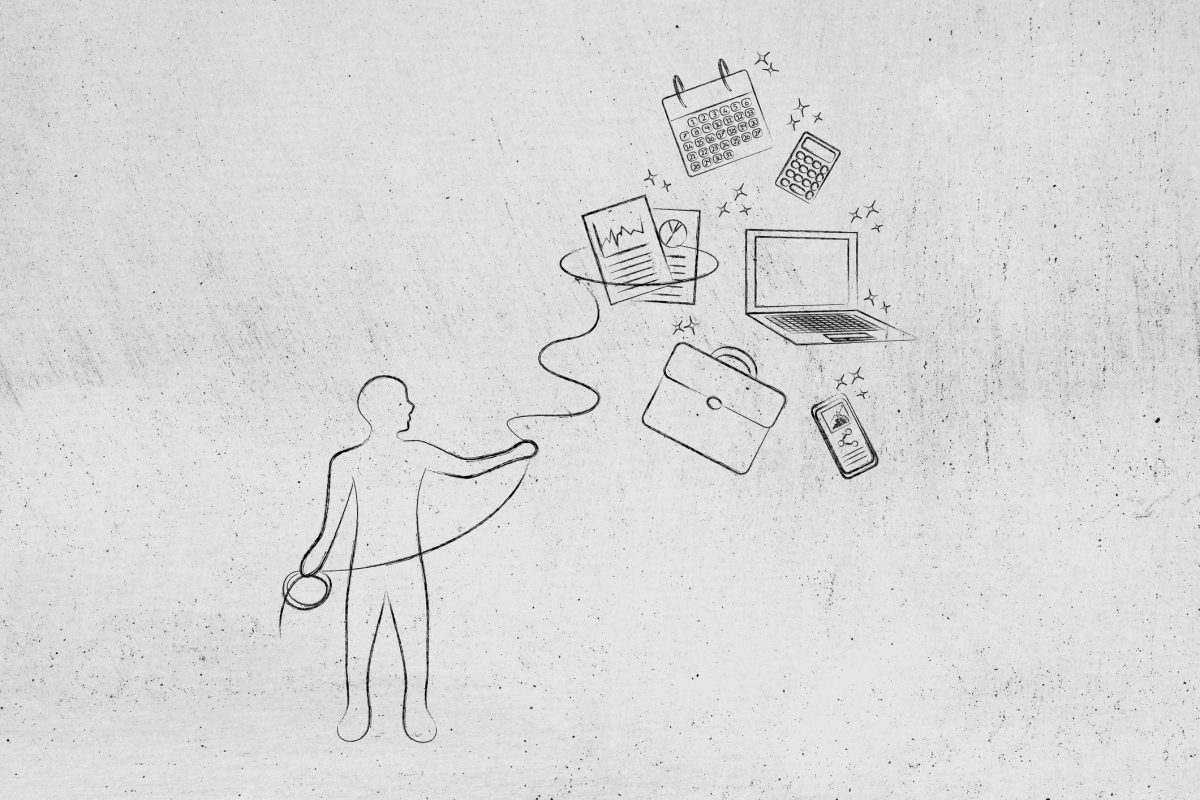Are you good at multitasking?
Most people think they are, but research indicates only 2.5% of people are actually able to do it — and that’s if multitasking actually exists. Let’s start at the beginning.
What is multitasking?
Multitasking is the ability to perform two or more activities at the same time.
For example:
- Reading a magazine while watching TV
- Writing a tweet while listening to a friend’s story, or
- Responding to emails while watching your daughter’s dance recital.
Technology has made attempting to multitask common, but attempting to do something is not the same thing as actually doing it, and many scientists say there’s no such thing as multitasking — only task-switching.
When we task-switch, our brains rapidly switch back and forth between two activities, and that can make us worse at both things. For “super-multitaskers,” however, the brain is able to efficiently shift between tasks while doing both well (more on that later).
What makes multitasking so difficult?
Scientists say that, even when we think we’re multitasking effectively, one or both activities are probably not being done to the best of our abilities. That’s because the human brain simply can’t do two things at once equally well. Your brain uses energy to go from one task to another, which means the brain power spent on making the switch isn’t available to use for the task at hand.
Most multitasking errors are small — wasted time spent re-reading a paragraph, or finding spelling errors in a proposal you drafted while on a conference call — but some can have serious consequences, such as texting while driving.
Can anyone actually multitask?
There are a few exceptions.
Proficiency
Research has shown that if you are really good at one of two tasks, you may be able to do two things at once. Because you’re good at Task A, your brain can put Task A on autopilot while the majority of your concentration is switched to Task B, which allows you to accomplish it properly. Think folding laundry while watching TV or listening to a podcast while mowing the lawn. But be careful: if you hit “autopilot” on one activity for too long, you might find yourself mowing over your rose bushes.
Super-multitasking
The second exception is rare — only 2.5% of the population can actually multitask without showing a loss of performance in either task. Those people are called super-multitaskers.
Dr. Christian Jarrett explains it using spinning plates. Imagine there’s a part of the brain that allows you to spin plates (the prefrontal cortex). While you spin, there’s another part (the anterior cingulate cortex) supervising the plate-spinning, looking for any plates that are about to fall. In most people, the brain gets overheated when asked to do both things at once, just like a computer can when too many programs are running. But a study found that super-multitaskers’ brains are able to “stay cool” in that situation, allowing them to perform both functions well under pressure.
There are tests for super-multitasking, most of which take 40-plus minutes and, of course, require your full attention.
So what’s a multitasker to do?
Test your task ability. Pick two activities you often do simultaneously and time yourself doing them. The next time, do the activities one after the other.
- If you perform both tasks well while doing them simultaneously you’re probably OK to task-switch between them.
- If one task suffered or took longer when combined with the other, or if the process caused you undue stress, split your time between the two tasks moving forward and see if that makes you better at both.
And remember: Studies have found that people who multitask often are typically not great at it, and the people who are capable of doing it don’t because they prefer to focus on one thing at a time.
Get more information about specific health terms, topics and conditions to better manage your health on bcbst.com. BlueCross BlueShield of Tennessee members can access wellness-related discounts on fitness products, gym memberships, healthy eating and more through Blue365®. BCBST members can also find tools and resources to help improve health and well-being by logging into BlueAccess and going to the Managing Your Health tab.






WellTuned provides inspiration and practical advice for healthy living.
WellTuned does not offer medical advice. Any personal health questions should be addressed to your doctor.